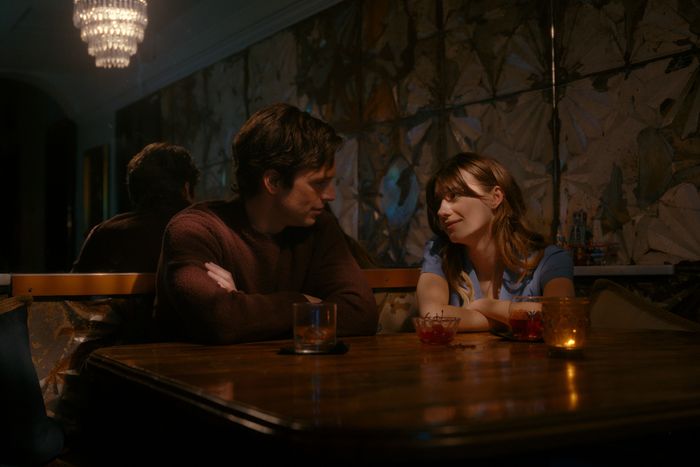
Sebastian Stan plays an entrepreneurial serial killer in Fresh, trolling for solitary women on the dating scene whom he kidnaps and holds captive, keeping them alive for as long as possible, while harvesting their flesh for a network of wealthy cannibals. Even worse, he’s the kind of foodie who insists on watching someone consume the dish he cooked for them and informing them of how much the ingredients cost. In the film’s best scene, Stan’s character, Steve, pushes a plate of pasta topped with a single murderous meatball toward Noa (Daisy Edgar-Jones), the film’s heroine, while holding forth on his personal journey into starting a monstrous meal-kit service as an instrumental version of “Exit Music (for a Film)” plays. It’s a facsimile of a bad date, where one party drones on about their interests and the other gets in the occasional question, only Noa is in chains, and before she takes a bite, she feels obliged to ask if the meat is her own.
Fresh is the directorial debut of Mimi Cave and was written by Ibiza’s Lauryn Kahn (a former assistant of Adam McKay’s, who is one of the producers), and it’s never as daring as it is in that particular sequence, when Noa plasters on a smile and opens her mouth because playing along is her best chance at getting away. The film, which premiered at Sundance in January, is a horror comedy, though its horror is never gnarly enough and its comedy doesn’t have enough teeth (rim shot!). What it does have going for it is a tremendously enjoyable Stan, whose razor-sharp jawline is outlandish enough to read as funny when it needs to, and who plays Steve as a West Coast answer to Patrick Bateman, a well-dressed professional with high-end taste, corny taste in music, and a smile handsome enough to obscure the coldness of his eyes. Steve and Noa have a meet-cute in a supermarket one night, and he’s disarmingly fumbling, lacing his self-deprecating flirtations with mentions of the family members he is headed to visit. Noa, worn out from the apps, allows herself to believe that she has actually met someone worthwhile the old-fashioned way.
And Steve turns out to be an ideal suitor, at least at first. They share intimacies over cocktails and fall into bed together, but only after he takes a moment to ask if they’re going too fast (“I don’t think I’ve ever heard a guy say that before,” Noa marvels). He’s a doctor. He owns a luxuriously appointed modernist house in the hills. He doesn’t think it’s too soon for them to spend the weekend together — in fact, he plans a getaway for them that turns out to be fateful. If Fresh had more of a satirical edge, it might have lingered in this space a while longer, devoting more time to the weariness that leaves Noa so ready to let her guard down and buy into Steve’s suspicious perfection. But despite a title sequence that arrives a leisurely half hour in, right around the time that both we and Noa realize something’s wrong, Fresh is more in a hurry to get to the cannibalism captivity than it is interested in the nightmare that is the Los Angeles dating scene or its main character’s battered but uncrushed idealism when it comes to romance.
Like a lot of movies these days, Fresh feels like it was conceived through its themes first and then written to bolster those ideas, rather than from the perspective of character or story. Its feminism is bold-faced and unexamined, with the film taking a late swipe at women who are complicit in the subjugation of other women, while never acknowledging the kind of woman who gets to occupy a higher place in the hierarchy of Steve’s victims, and who gets regarded as potentially more than just meat. There’s equally little awareness shown in giving Noa a devoted Black best friend, Mollie (Jojo T. Gibbs), whose existence seems to only involve dispensing advice and support (“My emotional dependence ain’t cheap, boo!” she declares early on). Edgar-Jones, of Normal People, acquits herself well as a final-girl type who refuses to be the only one left standing. But the film is so careful with her, as though it is as invested in her wispy vulnerability as its villain comes to be. When the time arrives for her to sacrifice a part of her body to Fresh’s gruesome premise, Steve cheerfully tells her, “I’m taking your ass,” in a sequence that’s practically restrained in its staging. The movie is willing to dabble in gore, so long as it doesn’t leave its heroine with any visible wounds.
More Movie Reviews
- Zack Snyder’s Screensaver Space Opera Comes to an Uneventful End
- What If We Didn’t Know Abigail Was a Vampire Movie?
- David Dastmalchian Deserves to Be a Star





